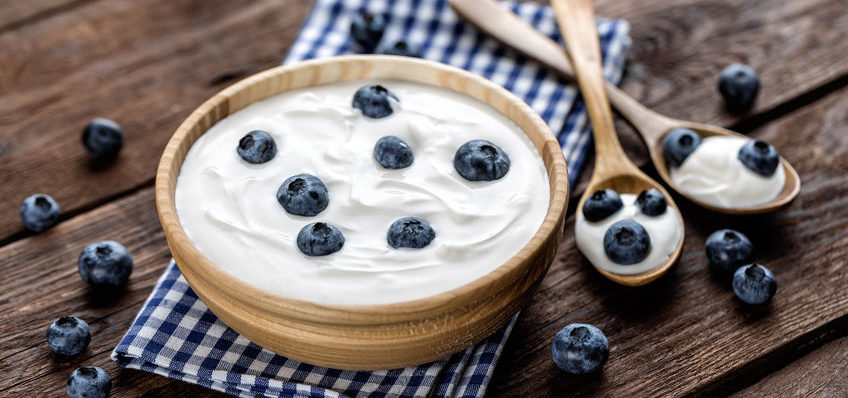
Yogurt is a fermented food product usually made from cow’s milk¹. Although this variety is the most common, there are other varieties produced using milk from goats, camels, and yaks. Commercial manufacturers of this food have evolved the traditional production process, creating types such as:
- Low-fat
- Non-fat
- Greek yogurt
- Kefir
- Skyr
- Frozen yogurt
- Non-dairy
Fermentation of the milk uses active cultures, providing some varieties of this food with live bacteria that make it probiotic. It is these live bacteria that give this food a reputation for boosting gut health. However, some varieties utilize heat processing, which kills the bacteria, reducing its health benefits.
Nutrients
Generally speaking, this dairy food product is chock full of nutrients², including:
- Calcium
- Vitamin B6
- Vitamin B12
- Riboflavin
- Potassium
- Magnesium
While the concentrations vary according to the type of yogurt, most contain some level of these vitamins and minerals. However, non-dairy varieties may be fortified for added nutrition, depending on the plant-based source.
For instance, a 100g serving of low-fat vanilla yogurt has the following nutritional values:
- 85 calories
- 4.93g of protein
- 1.25g of fat
- 0g of fiber
- 13.8g of carbohydrates
Whereas, a 100g serving of plain Greek yogurt’s nutritional values are:
- 61 calories
- 10.3g of protein
- 0.17g of fat
- 0g of fiber
- 3.64g of carbohydrates
To ensure a better nutrient-packed yogurt, choose a higher protein type like a Greek yogurt!
Health Benefits of Yogurt
The vitamins and minerals available in dairy yogurt are one of its most significant health benefits. As this food is high in B vitamins, it may help protect the body against heart disease and birth defects³. Furthermore, yogurt’s levels of calcium and potassium make it ideal for improving bone health⁴. Alongside its many capabilities, the magnesium present in this food helps boost the metabolism⁵. Additionally, the varieties of yogurt which possess probiotics can also encourage digestive health and help manage digestive disorders, such as Irritable Bowel Syndrome (IBS)⁶. Nonetheless, this food may not be suitable for some, including anyone who is lactose intolerant or sensitive to added sugars.
Sugar Levels in Yogurt
The high sugar levels in many types of yogurt have led some to question whether or not this food is healthy. According to Harvard’s School of Public Health, the recommended added sugar limit is 6 teaspoons for women and 9 teaspoons for men⁷. That translates to 24 and 36 grams of sugar, respectively. Some types of yogurt, even those marketed as low-fat, contain high amounts of sugar, which can easily set people over the daily limit. Therefore, it is vital to carefully read the label on this food and be aware of the many names sugar goes by. Some of the ways that manufacturers can label sugar⁸ are:
- Honey
- Agave nectar
- Barley malt
- Beet sugar
- Blackstrap molasses
- Fruit juice concentrate
- Cane juice
- Coconut sugar
The list of ingredients goes on. However, other than sugar and fat levels, yogurt can be a healthy and high protein supplement to your meals.
For more info, check us out on Youtube!
References
- “Yogurt: Food.” Eat Dat, Eat Dat, 20 May 2021, www.eatdat.com/food/yogurt/.
- Ware, Megan. “Yogurt: Types, Health Benefits, and Risks.” Medical News Today, MediLexicon International, 11 Jan. 2018, www.medicalnewstoday.com/articles/295714.
- Ryan-Harshman, W, and M Aldoori. “Vitamin B12 and Health.” Canadian Family Physician Medecin De Famille Canadien, U.S. National Library of Medicine, Apr. 2008, pubmed.ncbi.nlm.nih.gov/18411381/.
- Weaver, C M. “Potassium and Health.” Advances in Nutrition (Bethesda, Md.), U.S. National Library of Medicine, May 2013, pubmed.ncbi.nlm.nih.gov/23674806/.
- de Baaij, J H, et al. “Magnesium in Man: Implications for Health and Disease.” Physiological Reviews, U.S. National Library of Medicine, Jan. 2015, pubmed.ncbi.nlm.nih.gov/25540137/.
- Guyonnet, D, et al. “Effect of a Fermented Milk Containing Bifidobacterium Animalis DN-173 010 on the Health-Related Quality of Life and Symptoms in Irritable Bowel Syndrome in Adults in Primary Care: a Multicentre, Randomized, Double-Blind, Controlled Trial.” Alimentary Pharmacology & Therapeutics, U.S. National Library of Medicine, Aug. 2007, pubmed.ncbi.nlm.nih.gov/17635382/.
- “Added Sugar in the Diet.” The Nutrition Source, Harvard T. H. Chan School of Public Health, 2 Jan. 2019, www.hsph.harvard.edu/nutritionsource/carbohydrates/added-sugar-in-the-diet/.
- Peralta, Jessica. “Your ‘Healthy’ Yogurt Might Be Full of Sugar.” Healthline, Healthline, Sept. 2018, www.healthline.com/health-news/your-healthy-yogurt-might-be-full-of-sugar.
Ashuni Pérez is a writer in the culinary, as well as health and wellness industries. With a background in teaching and digital media, she loves to learn and help others discover more about their food, where it comes from, and how best to prepare it. A foodie through and through, she is always searching for new recipes and the freshest ingredients.











Leave A Comment